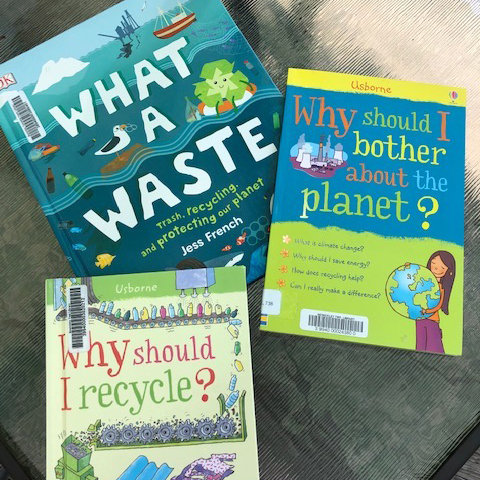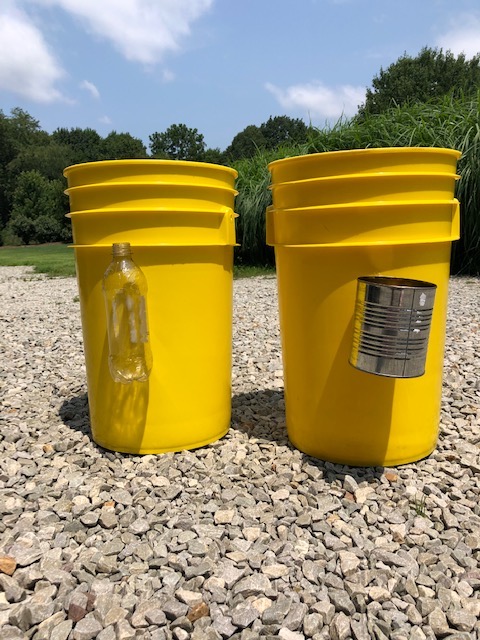
Little Hands Can Reduce, Reuse and Recycle With a Bit of Creativity
By Lori Waryanka
July 21, 2021
Taking out the trash and sorting through the recyclables are chores adults love to hate, but most of us probably don’t think twice about how the most mundane household activities can be life lessons for youngsters.
Teaching preschoolers about recycling can be engaging, fun and informative when you literally place the trash into those tiny hands. It’s one thing to tell a 4-year-old that plastic bottles and tin cans don’t belong in the household trash can because “it’s bad for the environment.” But it’s altogether different if that same child can take on the responsibilities of sorting, storing and saving those materials from the landfill themselves.
Creating a Kid’s Recycling Station
You may have already taken on craft projects for the kids that show them how to repurpose items such as glass jars, plastic milk jugs or egg cartons. And in that creative way, children learn that reusing is a way of reducing household trash. Teaching preschoolers the basic concept of recycling can be just as fun and exciting for them when they help to create their own recycling station at home.
For most of us, there are space constraints to consider when planning a recycling station for children. The garage or mudroom are perfect locations. A great idea is to limit that area to two receptacles — each designated for recyclables generated mostly by the kids. Maybe their snacks and cereals are packaged in cardboard boxes, and their water and other beverages are mostly contained in plastic bottles. One container can be labeled for cardboard and the other for plastics.
Containers and Labels
Regular household recycling bins just won’t work for this project. They’re just not fun! A sturdy cardboard box or large bucket is perfect for the kiddo recycling station because they can be decorated and personalized by the children. Either of these containers can be labeled using various types of craft supplies such as:
- Stick on foam letters,
- Construction paper and markers
- Cutout pictures from magazines
- Glue or tape
We created our recycling station for the garage by using two deep, yellow buckets purchased at a yard sale to hold plastic bottles and cans. Because the buckets are very sturdy we decided to attach the actual recyclables to the outside of the each bucket using a hook and loop fastener with adhesive backing. It’s a quick and easy way to label for youngsters who aren’t so creative or those who haven’t yet learned to read.
Our yellow bucket recycling center is being used by a little guy who has not mastered spelling or reading, but who is intensely interested in sorting and organizing objects. An extra bonus of recycling tin cans — he learned on his own that smaller-sized cans can be nested into larger ones to save space in the bucket!

What Can and Can’t Be Recycled?
Even for adults, it’s a bit confusing as to what household items are recyclable. Most guidelines suggest to always recycle plastic bottles and containers, food and beverage cans, paper and flattened cardboard. In general no food or liquids should be in containers and recyclables should not be placed into plastic bags.
In the City of Pittsburgh, online resources clearly outline what materials are accepted for recycling. There’s also a list of drop-off centers located throughout the city for those items. Waste Management offers recycling education tools online including printable posters. So when it comes to teaching preschoolers about recycling, it is a great idea to turn to professional resources both online or in print.
We found three great books written for children at our local library. Each have loads of photos and illustrations that would hold the attention of youngsters as you explain to them the information presented.
One of those publications, “What A Waste: Trash, Recycling, and Protecting Our Planet” by Jess French, covers a host of environmental issues. It answers some very basic questions, too — such as, where do the recyclables go if not to a landfill?
Finding the best answers to questions presented by the inquisitive preschoolers in our lives isn’t always the easiest task at hand, but it will never be as annoying as taking out that trash!

Leave A Comment